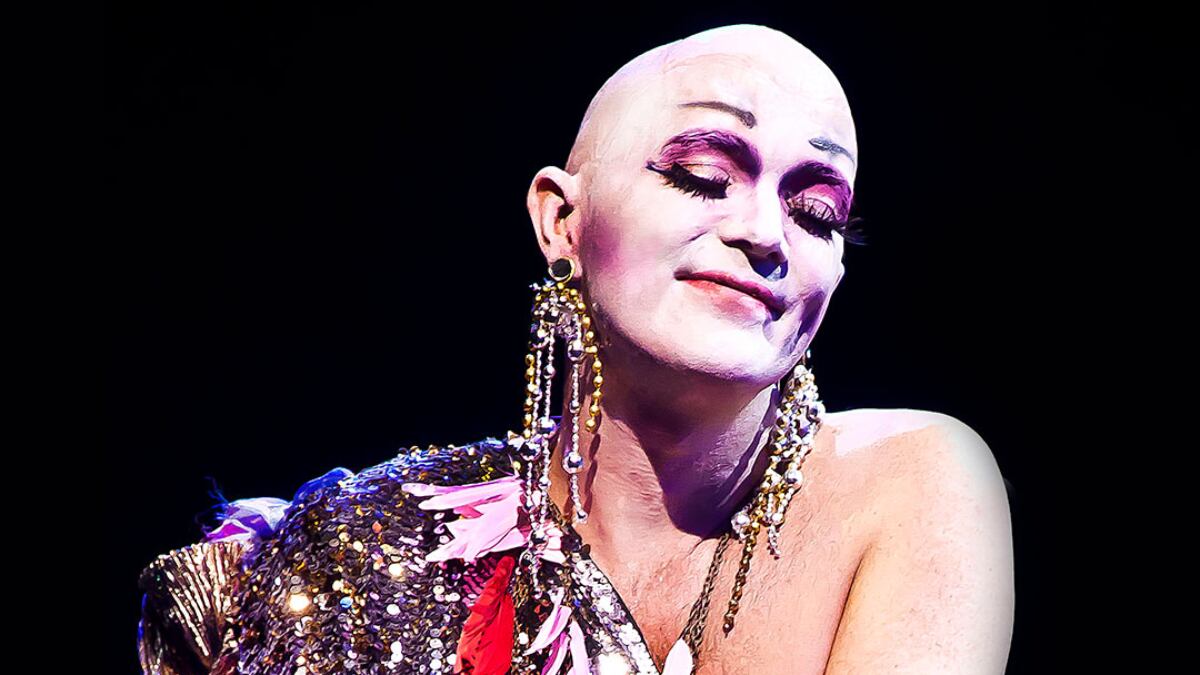Sponsored Content presented by Oregon Symphony
By 2011, Taylor Mac, a multihyphenate theater artist whose preferred gender pronoun is “judy” (as in Judy Garland), had already achieved so much. Performances around the world. An Obie Award for the play The Lily’s Revenge. Grants galore. Praise from multiple critics. It has all added up to the kind of career that could have allowed Mac to simply coast for the next few decades.
Instead, Mac chose to develop a big, bold project that would tap into judy’s skills as a singer, actor, songwriter, and activist: A 24-Decade History of Popular Music.
The concert/performance art spectacular does as the title promises. At its foundation, it is an overview of American history through the lens of nearly two-and-a-half centuries’ worth of songs from “Amazing Grace” to Lauryn Hill’s “Everything Is Everything.” But the entire concert is also, as Mac has dubbed it, “a radical faerie realness ritual” which uses the songs, Mac’s performance of them, and the fabulous costumes, created by the wonderfully-named designer Machine Dazzle, that judy wears throughout to put the spotlight on America’s marginalized communities who have, as judy says, “built themselves as a result of being torn apart.”
If that concept wasn’t great enough on its own, the scale of the work makes it even greater. A complete performance of A 24-Decade History of Popular Music is meant to take all day with each decade taking up a full hour. To date, Mac has only performed it in full once at a marathon event at Brooklyn’s St. Ann’s Warehouse in 2016. Otherwise, the show has been presented in short chunks, either in one-hour gigs during a long residency or broken up into four six-hour pieces.
When Mac arrives in Portland on March 31st for a performance of A 24-Decade History of Popular Music with the Oregon Symphony, the show will be even shorter, but no less powerful. As word of this radical revisionist history has spread around the world, the demand to hear at least some portion of it live has grown with it. Hence, an abridged version of the History has been touring around the world to the delight of lovers of musical theater, American counter culture and performance art.

What folks at the Arlene Schnitzer Concert Hall later this month shouldn’t expect is to be a passive observer. A major element of A 24-Decade History of Popular Music from its inception is audience participation. At the St. Ann’s Warehouse performance, Mac had attendees help re-enact a major Civil War conflict with the use of ping pong balls and pillows, sing along with classic tunes like “Take Me Out To The Ball Game” and “Camptown Races,” and, during a performance of “Snakeskin Cowboys,” an insidious tune from the even more insidious rocker Ted Nugent, getting everyone to slow dance.
That reframing of “Snakeskin Cowboys” is the perfect example of something else that has brought well-deserved attention to A 24-Decade History of Popular Music: recontextualizing problematic songs to radical ends. Nugent’s song is a nasty homophobic piece of work, but Mac and musical director Matt Ray turn it into, as Mac put it to Vulture, “a gay junior-prom ballad.” Elsewhere in the original show, Mac performs songs from The Mikado, Gilbert & Sullivan’s operetta, but sets the action on another planet because, as critic Wesley Morris wrote, “its minstrelsy might make sense if it was set on Mars.” And there’s that familiar hymn, “Amazing Grace,” of which Mac has said, “It’s thrilling and surprising to see a queen sing this song. I think it changes the audience’s perspective on what the show will be like but also what grace is.”
Chances are, if you snap up a ticket to see Taylor Mac’s A 24-Decade History of Popular Music on March 31, you already have some sense of what you’re in for. But no matter how open-minded you consider yourself, there will surely be something in the show that will challenge you and your preconceptions. Which is just how Mac likes it. “If you give people what they want, they’re going to ask for the same thing over and over again,” judy said in a recent video interview. “That’s not going to bring the culture forward. You should have to go through something. [I want] to get the audience to open up something in themselves that they didn’t think was possible.”
To purchase tickets or learn more about Taylor Mac, visit oregonsymphony.org.
